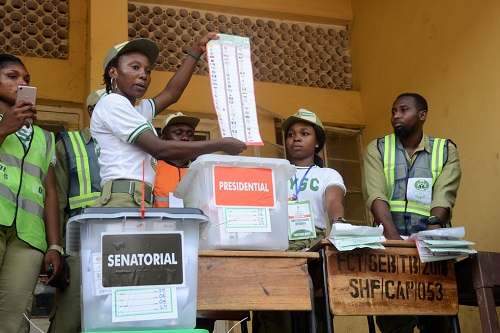COG photo
By
Ogunniyi Abayomi
Nigerians are anticipating the emergence of a new political cabinet, administration and office. They have made their choice known to the global community via democratic election and hereby await the candidate that will be at the helm of political affairs for the next four years.
The political journey in Nigeria is driven by men attaining the age of retirement, keeping the young people away from participating in every political activity in the name of inexperience.
These men are seen as important figures to an obscene structure hereby accommodating opaque policies that are against the progress of the masses. The electorates depend on these men to foster development, injecting ideas into a system whose beneficiaries are the cronies in the mask of a saint.
Politicians are emblems of truth, integrity, consciousness and honesty, values that every citizen upholds to create a sane society. They are the face of the people, the representative and image of the country across the continent who determine how a society is structured by the exhibition of individual conduct globally.
In every political journey, there is a timeline, a period whereby you are expected to carry out your duty to the masses, a given space of four to eight years to carry out the mandate of the people within society, building a legacy to follow within this short span of years in power.
The political narrative of Nigeria has endured several challenges and malaise from the moment we acquired our independence till the present day. The nationalist phase, the military phase, the republic phase and democratic phase of our political history expose several events that sabotaged the identity of Nigerians. Coup d ‘etat, Civil War, Boko Haram insurgency, herdsmen carnage amongst other events across each region created a dent in our sociopolitical identity as a state, nation and people.
Ethno-religious clashes create a divisive society under the disguise of one Nigeria; we speak and act in different voices claiming to be unified whereas we are not, exhibiting characters and action towards a citizen, creating a maligned society whereby Musa cannot live with Adeola and Uzochukwu because they don’t speak the same language and observe the same culture and values.
We observe this negative trait in our political offices hereby the opposing party utters negative commentary and analysis on the ruling party. They are neither speaking in the interest of the masses rather these political figures want to enhance their political careers via their criticism towards the opposing party to enhance its satirical selfishness in the mould of selfless leader deceit.
The 2019 election was an exposition of our polity and administrative skill as a state, country and government. Certain facts of inconsistency and poor planning by the Independent National Electoral Commission at the coordinating stages were indices of the poor implementation of strategies and policies yet the election commenced despite several challenges.
Prior to the commencement we saw a lot of drama from candidates of the newly elected party, the turnout and dramatic outburst between the political aspirant and his opposition, seeking to lure the mind of his electorate to ambition rather than the ideology he failed to build.
It was the man who promised to help his friends that looted against a man who promised to move Nigeria to the next level despite the below par performance of his administration and poor health challenges he encountered while he was in power.
The former was the vice president of Nigeria whom under his watch a public corporation was sold to a wealthy and affluent politician while the opposing candidate was the former head of state and sitting president, under his watch Nigeria had endured turbulent and harsh economic and sociopolitical conditions in its history.
Despite the emergence of a young presidential aspirant, these two elder statesmen were seen as the only candidates that could move the nation forward. It is proof that the Nigeria presidential slot has never been given to a young and emerging candidate except the godfather is no longer the president and he wanted to impose a candidate just like Obasanjo presented an ailing Yaradua during the 2007 presidential election, yet our problems remain unsolved.
Nigerian politics has been a game of numbers and population rather than a game of ideologies, the politician’s identity among the populace a major factor irrespective of your acts, age, behavior or personality. It is believed that the common man in this society rather hunts for a man who has been in the seat of power for a long time rather than a new man discarding his credentials and ideas.
Building on this ideology, it was a battle between a man of 72 and a man of 76 years old, fighting for the presidential seat excoriating the younger aspirant. Nigerians decided on the elder statesmen they wanted to see become their president irrespective of their frailties, the election was conducted and we saw the 76 year old man from Daura, Katsina State having the upper hand over the 72 year old from Adamawa State in a tense and rigid electoral contest.
The narrative of the old man political syndrome built on greed and manipulation seems unending within the political sphere, a game of elder statesmen taking the future star out of the game proof that the system is but a few individuals to get in and do what they want. It was to be expected and what we have to endure until we are ready, which we are not yet.
Ogunniyi Abayomi
Ogunniyi Abayomi was born July 11, 1991 in the city of Lagos, where he resides. A poet and essayist whose works have been published in various journals.



No Comments Yet!
You can be first to comment this post!